| | | OFFLINE | | Post: 21.170
Post: 3.806 | Registrato il: 28/08/2005
Registrato il: 20/01/2009 | Administratore | Utente Master | |
|
 GENERAL AUDIENCE TODAY:
GENERAL AUDIENCE TODAY:
Catechesis on St. Gertrude the Great
In his catechesis today, the Holy Father spoke of St. Gertrude the Great, a contemporary of the 12th-century Mathilde of
Hackeborn who was the subject of last week's catechesis.
St. Gertrude is the fourth of the great medieval female saints in the Pope's current catechetical cycle that he began when
he resumed the General Audiences after the summer break. His first two subjects were Hildegarde of Bingen and Clare of
Assisi.
He also reminded the faithful that tomorrow is the feast of Our Lady of the Rosary and that October is the month of the Rosary.
Here is how he synthesized the catechesis in English:
Our catechesis today focuses on Saint Gertrude the Great, a remarkable figure associated with the monastery of Helfta,
where so many masterpieces of religious literature were born.
Saint Gertrude is the only woman of Germanic descent to be called "Great", an honour due to her exceptional natural and
supernatural gifts. As a youth, Gertrude was intelligent, strong and decisive, but also impulsive. With humility she asked
others for advice and prayer.
Eventually, she experienced a deep conversion: in her studies she passed from worldly pursuits to the sacred sciences,
and in her monastic observance she moved from concern with external things to a life of intense prayer.
In her writings, she sought to explain the truths of the faith with clarity and simplicity, while not failing to develop
spiritual themes associated with Divine Love. In her religious practice, she pursued prayer with devotion and faithful
abandonment to God.
Dear friends, may we learn from Saint Gertrude the Great how to love Christ and His Church with humility and faith, and
to cultivate our personal prayer through an intense participation in the Holy Mass and the sacred liturgy.
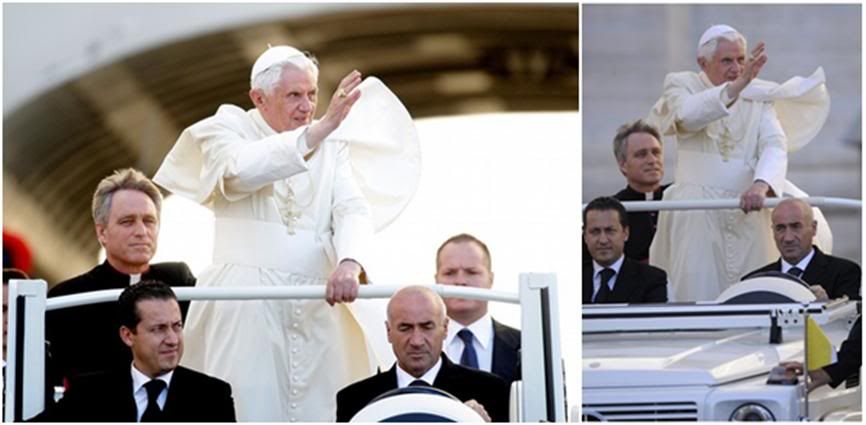
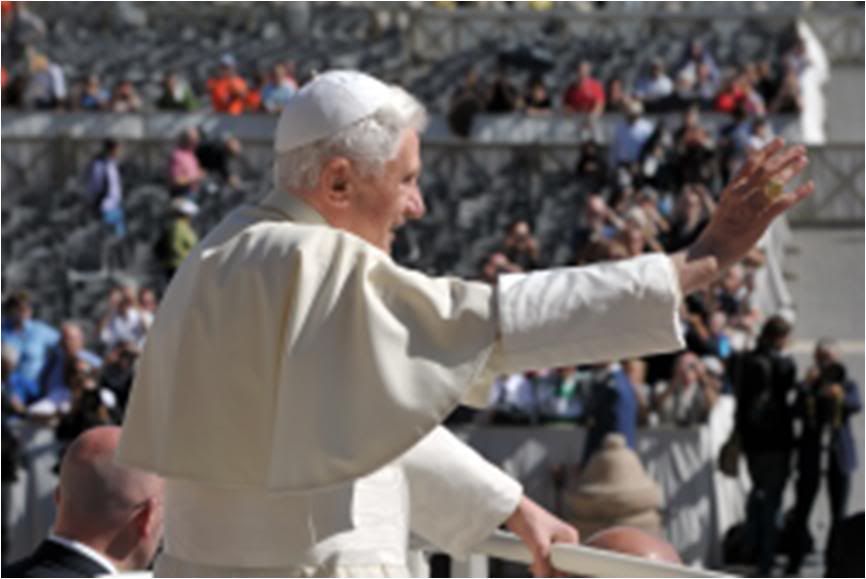 Saint Gertrude the Great:
Saint Gertrude the Great:
A model of faith and humility

Oct. 6, 2010
The Pope today stressed the importance of prayer, and faith during his catechesis, at his weekly general audience.
Pope Benedict arrived into an autumnal but sunny St Peter’s Square on Wednesday to be greeted by thousands of pilgrims and
tourists.
As has become customary at his weekly general audience the Holy Father in his catechesis this Wednesday focused on great
women of the early Church, recalling the figure of Saint Gertrude the Great:
“Saint Gertrude is the only woman of Germanic descent to be called 'Great', an honour due to her exceptional natural and
supernatural gifts. As a youth, Gertrude was intelligent, strong and decisive, but also impulsive. With humility she asked others
for advice and prayer.
"Eventually, she experienced a deep conversion: in her studies she passed from worldly pursuits to the sacred sciences, and in
her monastic observance she moved from concern with external things to a life of intense prayer.”
The Pope then went on to talk about this Saint's written works which drew on spiritual themes:
“In her writings, she sought to explain the truths of the faith with clarity and simplicity, while not failing to develop spiritual
themes associated with Divine Love. In her religious practice, she pursued prayer with devotion and faithful abandonment to
God. Dear friends, may we learn from Saint Gertrude the Great how to love Christ and His Church with humility and faith, and
to cultivate our personal prayer through an intense participation in the Holy Mass and the sacred liturgy.”
Towards the end of his audience the Holy Father welcomed all the English visitors and pilgrims and he especially extended his
greetings to the Candidates for Diaconate Ordination from the Pontifical North American College.
One of those candidates listening to the Pope’s words was Seminarian Jim Baron from Colorado Springs in the U.S.
“It’s a tremendous opportunity to be with the Holy Father today, especially with all my parents and friends and family, with my
bishop as a real sign of the importance of the family.”
The Pope also had greeting for to the new students and staff at the Pontifical Beda College, and to pilgrims from, Dublin
in Ireland.
Shortly after the Popemobile started touring the audience sectors, Mons. Gaenswein put on the Pope's saturno for him, against an October sun that is still fierce in Rome.

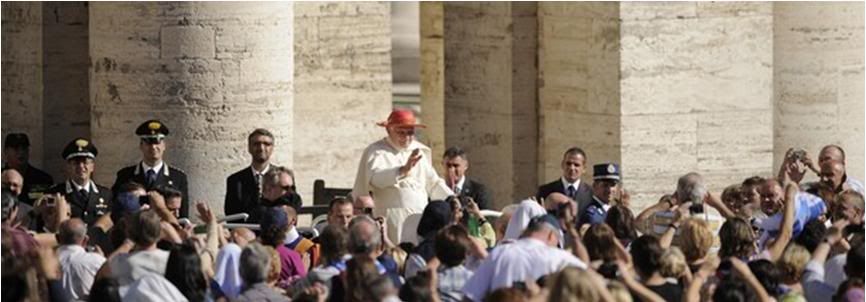
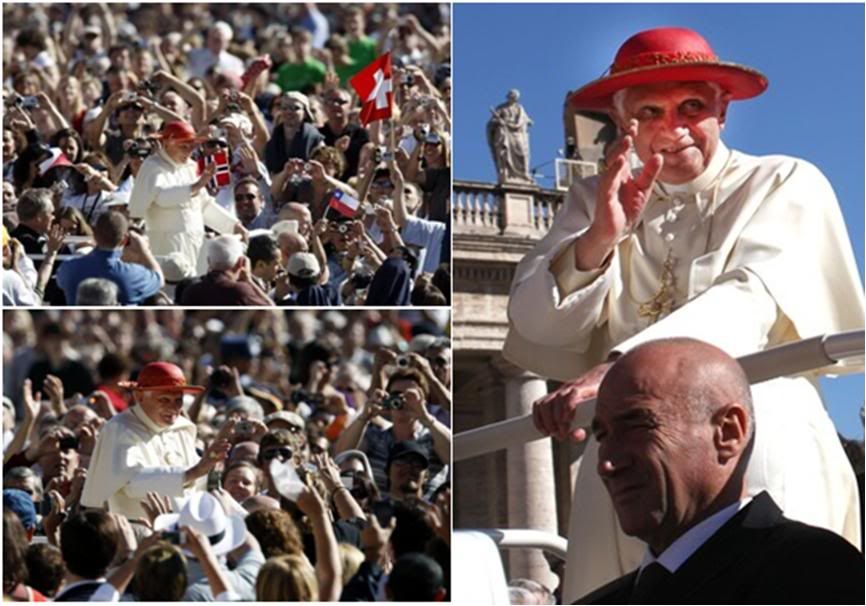
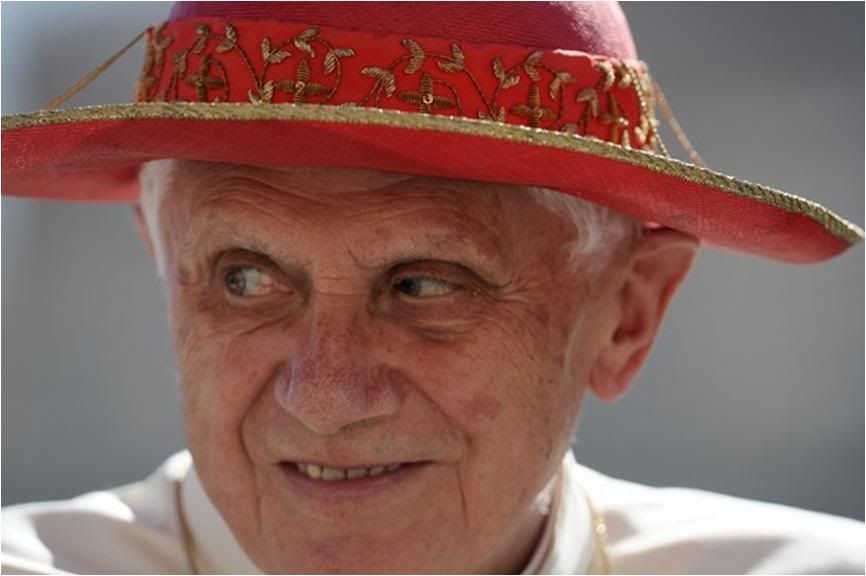


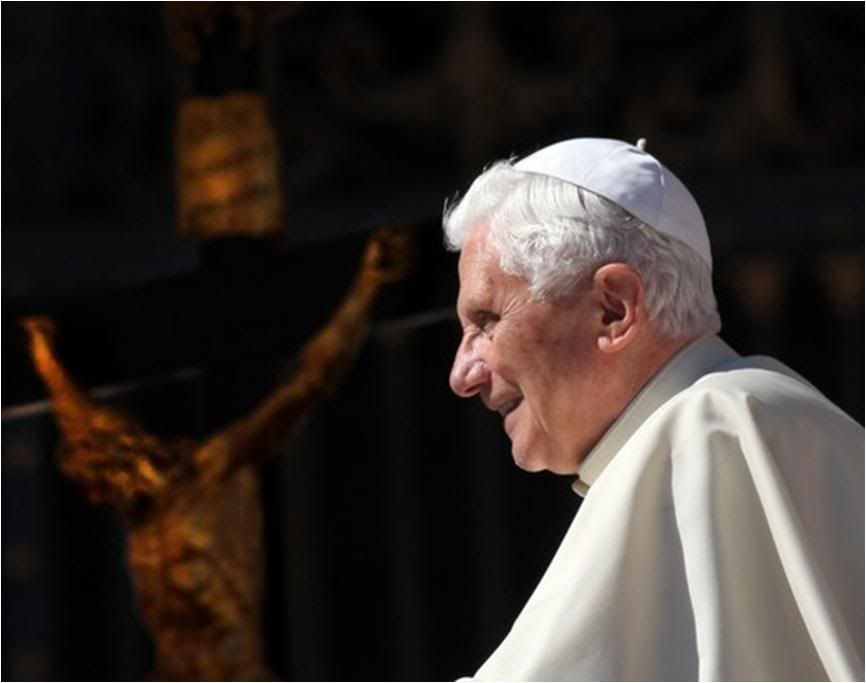
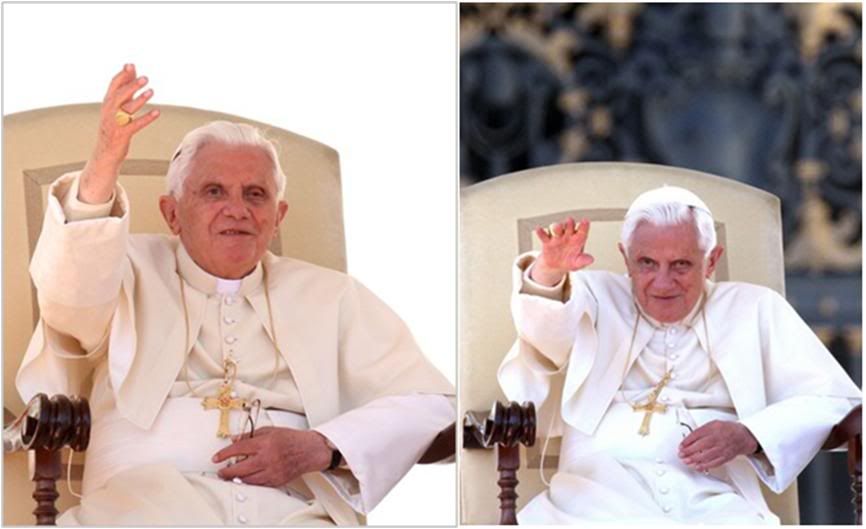
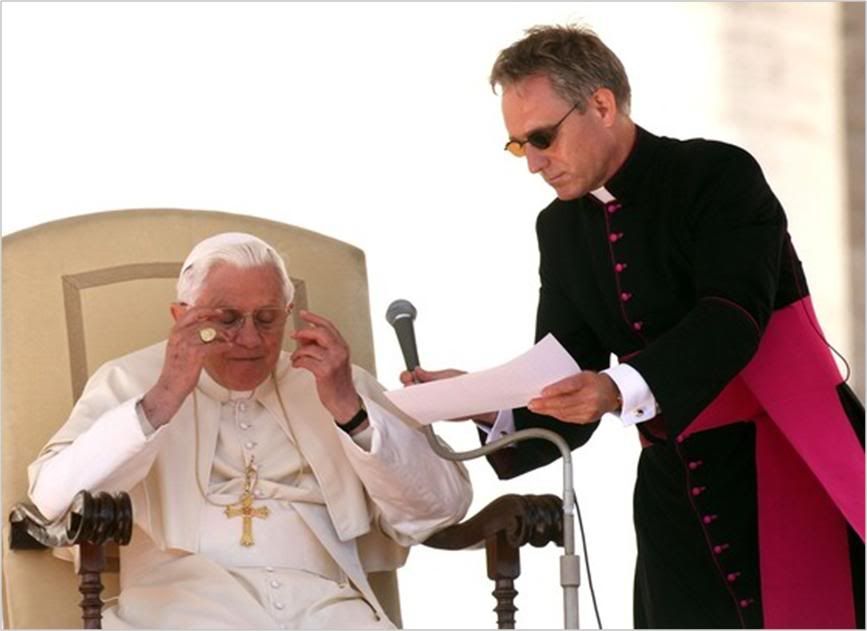 Here is a full translation of the Holy Father's catechesis:
Here is a full translation of the Holy Father's catechesis:

Dear brothers and sisters:
St. Gertrude the Great, of whom I wish to speak today, brings us this week back to the German monastery of Helfta,
which gave birth to some of the masterpieces of religious literature written by women in Latin and German.
To this world belonged St. Gertrude, one of the most famous of mystics, the only female in Germany to have merited the
appellative 'the Great' for her cultural and evangelical status. With her life and thought, she left an incisive impression
on Christian spirituality.
She was an exceptional woman, endowed with special natural talents and extraordinary gifts of grace, with the most
profound humility and ardent zeal for the salvation of her neighbor, one who had intimate communion with God in
contemplation and in her promptness to aid those in need.
In Helfta, she was systematically confronted, so to speak, with the example of her teacher Mathilde of Hackeborn, whom
I spoke of last week; she was in the company of another medieval mystic, Mathilde of Magdeburg; and she grew up under
the maternal, kind but demanding care of the Abbess Gertrude [elder sister of Mathilde of Hackeborn].
From her three fellow nuns, she drew treasures of experience and wisdom, which she elaborated and synthesized in her
own way, as she followed her religious itinerary with unbounded confidence in the Lord.
She expressed the wealth of spirituality not only in her monastic world, but also and above all, that of the Biblical,
liturgical, patristic and Benedictine worlds, with a most personal stamp and great communicative efficacy.
She was born on January 6, 1256, on the Feast of the Epiphany, but we know nothing of her parents nor where she was
born. Gertrude wrote that the Lord himself revealed to her the meaning of her first uprooting:
"I chose her for my dwelling because I wished that everything that is lovable in her should be my work... For this reason,
I took her far away from her parents, so that she should love no one because of consanguinity but that I should be the
only reason for the affections she has" (Revelations, I, 16, Siena 1994, p. 76-77).
At the age of 5, in 1261, she entered the convent, as they used to do in those days, for study and formation. And it was
there that she spent her whole life, whose most important stages she herself tells us.
In her memoirs, she recalls that the Lord had provided with patience and infinite mercy - forgetting the years of her
infancy, adolescence and youth, which, she wrote, "I would have gone through with such mental blindness in order that
I could... think, say or do without any remorse all that I wished to do and wherever I could - if you had not provided for me
both through an inherent horror of evil and a natural inclination for the good, as through the external vigilance of others.
I would have behaved like a pagan, even if you had wanted that from age 5, I should live in a blessed shrine of religion
in order to be educated among your most devoted friends" (Ibid., II, 23, p. 140s).
Gertrude was an extraordinary student - she learned all that could be learned of the sciences of the Trivium and
Quadrivium, which was the formation required at the time. She was fascinated by knowledge and devoted herself even to
profane [i.e., secular] knowledge with ardor and tenacity, achieving scholastic success beyond all expectations.
If we know nothing of her origins, she herself tells us a lot about her juvenile passions: she was captivated by literature,
music and song, and the art of miniature painting. She had a character that was strong, decisive, immediate and
impulsive. She says she was often negligent - she acknowledged her own defects which were with her to the end, and
there were those who wondered how, despite this, the Lord should have favored her so much!
From being a student, she went on to consecrate herself totally to God in the monastic life, and for twenty years
afterwards, nothing exceptional took place. Study and prayer were her principal activities. She excelled over her
colleagues with her gifts, and she was tenacious in consolidating her culture in diverse fields.
During the Advent of 1280, she started to feel distaste for all this, realizing their vanity, and on January 27, 1281, a few
days before the feast of the Purification of the Virgin Mary, around the hour for Complines, in the evening, the Lord
enlightened the dense shadows that had settled on her.
With gentleness and kindness, he calmed her disquiet and anguish, a disquiet that Gertrude saw as a gift itself from God
"in order to knock down the tower of vanity and curiosity that, alas, although bearing the name and the habit of a
religious, I had been raising up with my pride*, thinking thus to find the way for you to show me your salvation" (Ibid.,
II,1, p. 87).
She had a vision of a young man who showed her how to overcome the tangle of thorns that oppressed her soul, taking
her by the hand. And in that hand, Gertrude recognized "the precious traces of those wounds that had abrogated all the
accusations of our foes" (Ibid., II,1, p. 89), recognizing him who had saved us on the Cross with his Blood, Jesus.
From that moment, her life of intimate communion with the Lord intensified, especially during the most significant
liturgical times - Advent-Christmas, lent-Easter, the feasts of the Virgin - even when she was unable to join the choir
because of illness.
The same liturgical humus that had nourished her teacher Mathilde, Gertrude described in more simple and linear, more
realistic images, symbols and expressions, with more direct references to the Bible, to the Fathers, and to the Benedictine
world.
Her biography indicates the two directions of what we might define as her particular 'conversion': In her studies, with her
radical passage from profane humanistic studies to theological studies; and in her monastic observance, from the life she
had defined as negligent to an intense, mystical life of prayer, with exceptional missionary ardor.
The Lord, who had chosen her from her mother's womb and had made her take part, since she was a child, in the
banquet of monastic life, reclaimed her with his grace "from external things to the interior life, and from earthly concerns
to love of spiritual things".
Gertrude understood that she had become distant from him, to the point of dissimilarity, as she said, echoing St.
Augustine: having been dedicated with too much avidity to liberal studies and to human wisdom, while neglecting
the spiritual science, depriving herself of the taste for true wisdom.
Now she was led to the mount of contemplation, where she would leave behind her old being to put on a new one:
"From a grammarian, she became a theologian, with tireless and attentive reading of all the sacred books that she could have
or procure. She filled her soul with the most useful and sweetest sentences of Sacred Scripture, so she always had
an inspiring and edifying word for those who came to consult her; as well as all the Scriptural texts most suitable to refute
any erroneous opinion and to shut up her opponents" (Ibid., I,1, p. 25).
Gertrude transformed all this into an apostolate. She dedicated herself to writing and expressing the truths of the faith
with clarity and simplicity, grace and persuasiveness, serving the Church with love and fidelity, in which she was found
useful and pleasing by theologians as well as by pious people.
Little is left for us of her intense spiritual activity, chiefly because of the events which led to the destruction of
the monastery of Helfta.
What is left to us are L'Araldo del divino amore (the Herald of divine love), also called The Revelations, and
the Spiritual Exercises, a rare gem of mystical literature.
In her religious observance, our saint was "a firm pillar..., a most steadfast proponent of justice and truth" (Ibid., I, 1,
p. 26), her biographer says. With her words and example, she inspired great fervor in others. To the prayers and penitences
prescribed by the monastic rule, she added others with such devotion and trusting abandonment to God, that she inspired
in those who met her the consciousness of being in the presence of the Lord.
Indeed, God himself made her understand that he had called her to be an instrument of his grace. Gertrude felt unworthy
of this great treasure from God, and confessed that she had not safeguarded and appreciated it enough.
She exclaims: "Alas, if you had given me in your memory, as unworthy as I am, even a single thread of sackcloth,
I would have had even greater respect and reverence for all that I had because of your gift!" (Ibid., II,5, p. 100).
But acknowledging her poverty and her unworthiness, she followed the will of God, "because," she says, "I have availed
so little of your graces that I cannot bring myself to believe that you had provided them to me alone, but your eternal
wisdom must not be frustrated by anyone. Therefore, Giver of every good, who has gratuitously given me such
undeserved girts, grant that in reading this, the heart of at least one of your friends may be moved to think that your zeal
for souls has led you to leave for some time a jewel of such inestimable value in the abominable mud of my heart"
(Ibid., II,5, p. 100s).
Two favors in particular were most dear to her more than any others, as Gertrude herself wrote:
"The stigmata of your health-giving wounds that you imprinted on my heart, almost like precious jewels, and the
profound and salutary wound of love with which you marked it.
"You flooded me with your gifts of such beatitude that, even if I should live a thousand years without any internal nor
external comfort, their memory alone would be enough to comfort me, illumine me, and fill me with gratitude.
"May you still wish to introduce me into the inestimable intimacy of your friendship, opening to me in various ways
that most noble shrine of Divinity that your divine heart is...
"To this wealth of good things, you have added that of giving me for my Advocate the Virgin Mary, your Mother, and to
have commended me to her affections as the most faithful of husbands might commend his beloved spouse to his own
mother" (Ibid., II, 23, p. 145).
Striving for communion without end, she ended her earthly life on November 17, 1301 or 1302, when she was almost 46.
In her seventh Exercise, that of preparation for death, St. Gertrude wrote: "O Jesus, you you are immensely dear to me,
be with me always, so that my heart may remain in you and your love perseveres in me without possibility of division,
and that my passage may be blessed by you, so that my spirit, loosed from the bonds of flesh, may immediately find
repose in you. Amen" (Esercizi, Milano 2006, p. 148).
It is obvious that these are not simply things of the past, historical, but that the life of St. Gertrude continues to be
a school of Christian life, of the right road, which shows us that the center of a happy life, of a true life, is friendship
with Jesus, our Lord.
This friendship is learned in love for the Sacred Scripture, in love for liturgy, in profound faith, in love for Mary, so that
we may know God in an ever more real way, and thereby, true happiness, which is our goal in life.
Thank you.
At the end of his plurilingual greetings, he said this in Italian:
Tomorrow the Church celebrates the Feast of Our Lady of the Rosary. October is the month of the Holy Rosary, inviting us
to value this prayer which is so dear to the tradition of the Christian people.
I ask you, young people, to make the Rosary your daily prayer. And I encourage you, dear people who are ill, to grow,
thanks to reciting the Rosary, in trustful abandonment into the hands of God. I call on you, dear newlyweds, to make
the Rosary a constant contemplation of the mysteries of Christ.
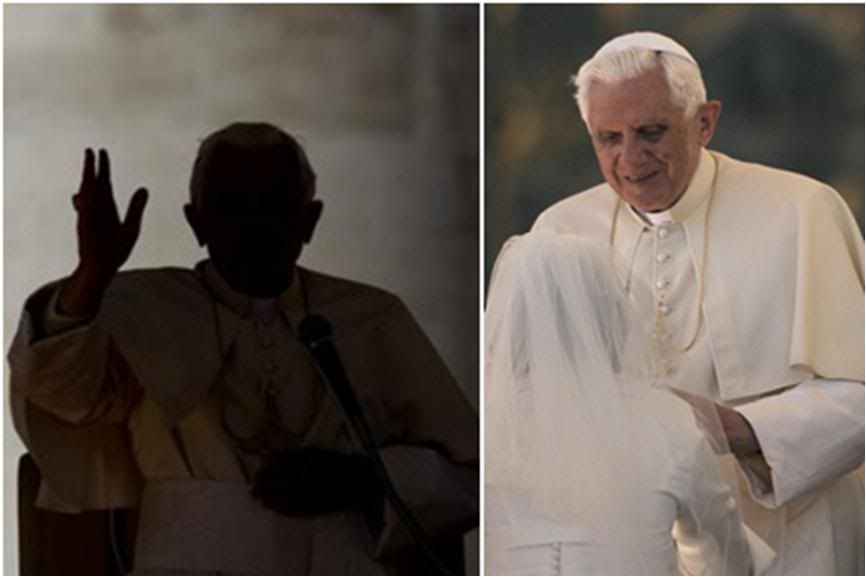
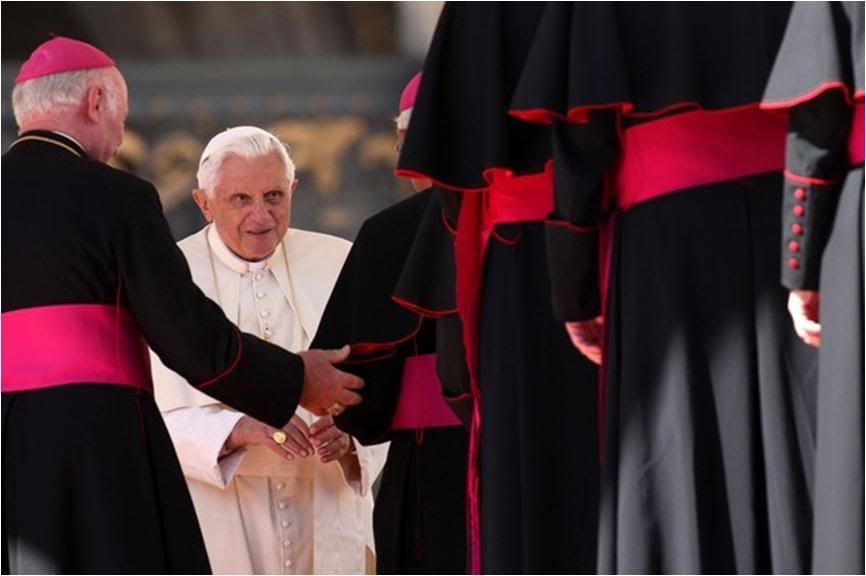
* Speaking of the 'pride' that the saint refers to, I cannot resist reporting a quotation attributed to Gertrude the Great, from the website
www.kloster-helfta.de/seiten/22.htm
of Kloster Helfta (the monastery has been under physical rehabilitation since 2003 from its earlier destruction):
"No man shall surpass me in learnedness."
[Modificato da TERESA BENEDETTA 07/10/2010 02:46] |